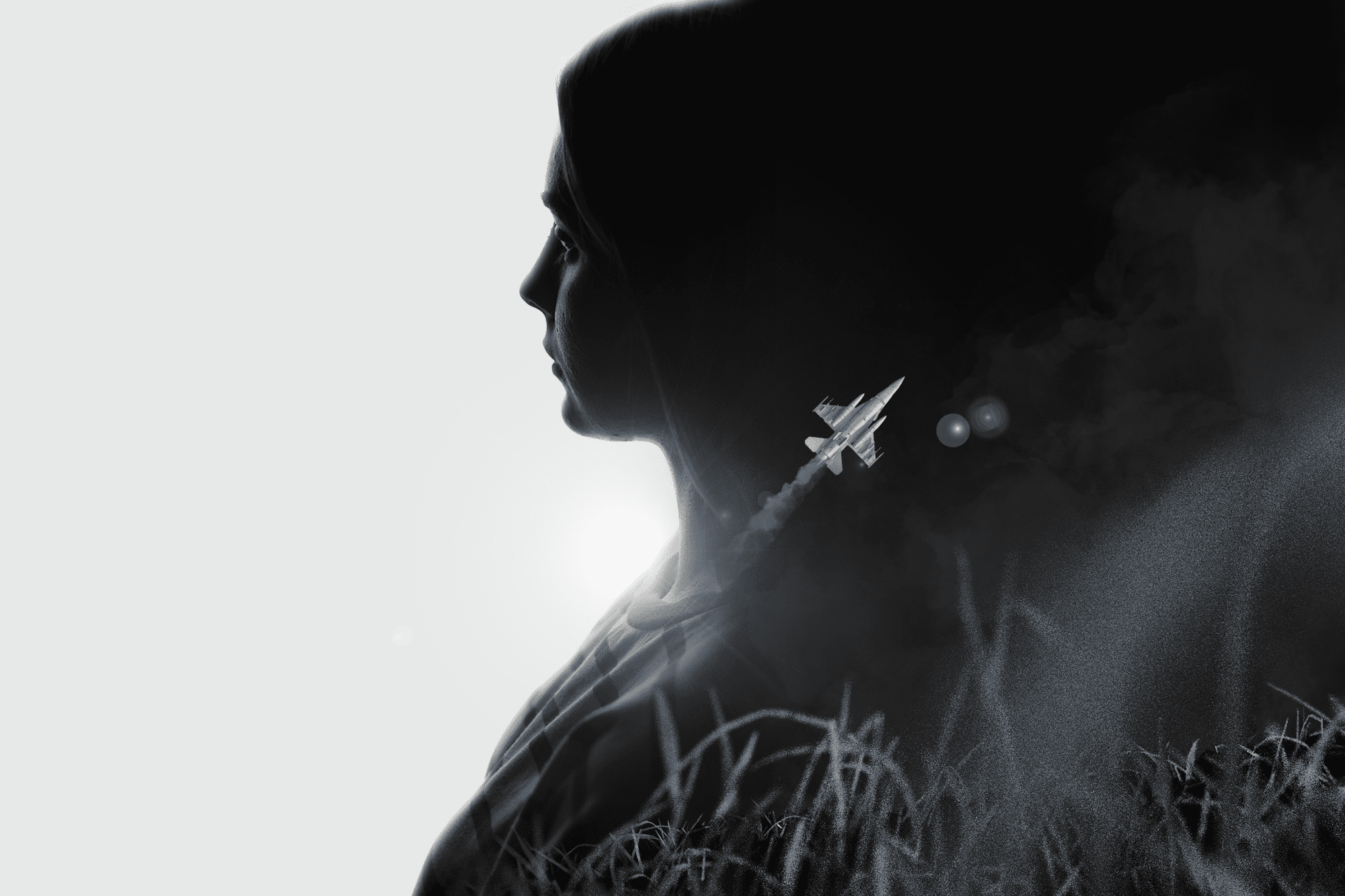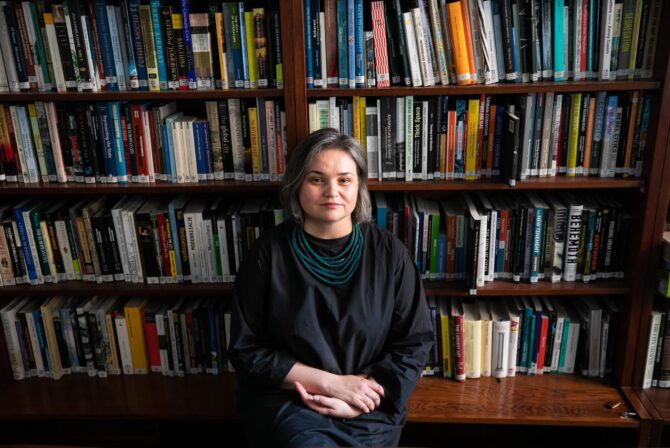For some reason, what sticks in my memory are the dust particles, gently swaying in the golden light of an August pre-sunset. They stirred from the thick hotel bedspread in Zhytomyr, rising sharply when I collapsed face-first into it, screaming. Not just a scream, but a beast roar—so raw, the person on the other end of the phone staggered under the weight of my despair. I knelt by that bed, wailing into the bedspread, at the bed itself, at the center of the earth, at hell. I screamed because I had heard the cracked words: “He didn’t suffer, Melanie.”
Life
I met Juice in the most ordinary way—through work. I don’t think I knew how to meet people any other way. It all began in the typical fashion: an idea for an interview, weeks spent coordinating, days spent preparing. The person who connected us gave me a heads-up: “He’s nervous about meeting you, barely agreed to do it. Be gentle.” I grumbled back, “Maybe he should let someone else interview him.”As it turns out, that warning wasn’t exactly a fair interpretation of Andrii’s sense of humor. Still, the impression was already planted in my mind. So, in our initial exchanges, I was professional, restrained, not particularly warm. He was a pilot, a military guy, what a big deal! Honestly, I wasn’t that excited about it.
But then, Andrii turned out to be so much more than I expected—charismatic, charming, and, above all, incredibly funny. By the time the interview wrapped up, we were chatting like old friends. The next day, we had our first phone conversation, which lasted over an hour but felt like mere minutes. A few days later, when he asked me out on a date, I agreed, even though I didn’t have high hopes. A military man, a pilot, constant deployments, the war it seemed impossible for anything to come of it. But when we met in person, my legs went weak.
I remember the thought that flashed through my mind so clearly: “Oh, God. Don’t fall in love.” But I did, it took me about a second and a half. Thankfully, it was mutual.
Unfortunately, I only got to know Andrii as a son, a friend, and a comrade after his death. I came to understand him through his mother, my own mentors from youth, his friends, and fellow pilots. It became clear that Andrii didn’t need a monument. He already was one. Everyone said the same things: “There will never be another like him,” “a role model,” “a hero who shunned the spotlight,” “our pride.” A Ukrainian fighter jet flight engineer told me, “Andrii changed the course of aviation history in Ukraine.” An attack pilot sighed, “A commander of the Air Force that we wished we had had.”
I knew Andrii in two different ‘aggregate states.’
There was Juice, the legend, a fierce hawk, one of the ‘Ghosts,’ and a brilliant, stubborn fanatic. In aviation jargon, a ‘marasmus’ is someone obsessed with their field, and that was Juice. He made me learn everything—from the emergency fuel capacity of a MiG-29 (550 kilograms) to the early serial modifications of the MiG-21 (the first with onboard radar was the MiG-21 PF). And he once gave me a forty-minute lecture on the F-16 fighter jet, completely forgetting I was even on the other end of the line. But honestly, I brought this on myself. Our very first phone conversation started with me asking about advanced airborne gunners and the use of unguided missiles in army aviation, so I should’ve known what I was getting into.
Then there was Andrii, a loving, anxious, yet gently firm romantic. He was the guy who, during air raid alerts, would wake me up with a soft but insistent voice, urging me to at least move to the hallway if I wouldn’t go to a shelter. He stayed up with me on video calls, watching over me when I was sick, and sent me pictures of airfield puppies just to lift my spirits.
I knew him also as an adventurer. He would never tell me when his rotations were, so he could surprise me with his arrival. Sometimes, he’d make me wait an hour at the train station because he’d come straight from a flight and had to buy flowers on the way, just because “it was the right thing to do.” Like anyone, he feared the future. He was afraid of letting me down, of not being able to support me, and of struggling to live a normal civilian life. Above all, he was afraid I’d end up alone.
He melted to see how much I supported him, how genuinely interested I was in his work. I was melted to be with a legend and an incredibly brave son of our country.
That was how we lived: he at the airfields, and I on the trains to see him. He was afraid he wouldn’t save me from a Shahed drone; I was afraid he would, but at the cost of his own life.
It was a strange, bittersweet kind of love.
We did our best to pretend that everything was normal. In the evenings, when we managed to see each other, we hid from the world in each other’s arms.
Now, anyone can learn a lot about Andrii Pilshchykov with a quick search. Most of what people know came out after his death, as is often the case. But that’s no accident.
Andrii never sought publicity. “My face is the face of the Air Force,” he would say. He loved his freedom, valued the safety of his loved ones, and had no ambitions for a high-profile career. I admired that—his humility and sense of sacrifice. I didn’t want to hurt him or share him with the world. I didn’t want to let anyone else into our life. But at the same time, I wanted Andrii to receive the recognition he deserved. He had a complicated relationship with his superiors. His bold, principled stance and open disdain for incompetence had caused trouble for him at work more than once. I thought that maybe if he stepped into the spotlight, people would finally see the courage and hard work he gave every day. But I respected his choice. Only a very small circle of friends quietly celebrated us.
Death
A fighter pilot’s combat is in solitude. So is his death.
His death is almost always without the chaos of dugouts or trenches, without the screams or the stench of burning. But it’s also without a brother’s hand on his shoulder, without the frightened, sympathetic gaze of a commander, without a chance to whisper final words to his wife or children.
Once, I had the misfortune of watching the final video from a pilot’s helmet camera in the moments before he was killed. The last seconds of his life.
A sharp maneuver. The sound of air whipping past the wings. Then, suddenly, a problem. The pilot fought for control, but the aircraft began to spin, like a car sliding on ice. He reached for the ejection handle; a parachute briefly appeared on-screen, but it never fully opened. The pitch and roll of the plane wouldn’t allow it. Then the camera froze on one angle—the sky, the sun, and a dark silhouette in the light. It was an eerie sight: a giant fighter jet plummeting to its end, its fate sealed. It was like staring death in the face. That’s not how Andrii died. He didn’t even get a chance to fight the plane. He was sitting in the wrong seat.
Without diving into the details of what happened, I can only say this: Andrii and I had discussed the possibility of his death many times. We considered every scenario, exchanged instructions, and imagined the worst. Andrii dreamed that if he had to go, it would be in battle, taking as many Russians with him as possible, crashing down on an enemy command post. What he feared most was dying either in the rear or as a “sack” (a term I won’t explain here). Life, as war constantly reminds us, is cruel and unfair, even to the best and the most glorious of us. Andrii got both.
If there’s one thing I’ve learned during this war, it’s that death doesn’t just happen to the person—it happens to everyone around them.
The strangest part was realizing that Andrii was really gone. His comrades found his phone and sent it to me so I could tell his mother. I wrote desperate messages to the void, hoping it was a nightmare or some terrible mistake. When I finally held his phone in my hands, reality closed in. The circle was complete. I didn’t cry. I simply put the phone in my pocket and strolled home as if nothing had changed.
My mind must have been protecting me from the trauma, just as it had during the morgue identification. The day after Andrii’s death, when I was given the patch from his uniform, my body gave out. I don’t remember much—just collapsing into someone’s (was it Yulia, Vitalik or Masi, I don’t know) arms and hearing Yulia say, “She’s not going anywhere, and she won’t look.” I’m still grateful they made that decision for me. Because of it, I can remember Andrii the way he was just two hours before he died—smiling, in love, and saying, “I’ll be right there, my love, just a short flight.”
The second event that changed everything for me was when I finally let go of the paralysis of grief. Andrii’s comrades, along with their wives, spent a few days at my house over the Christmas holidays. During the day, we laughed, trying to find moments of joy. But at night, when darkness fell and we could no longer avoid the weight of our losses, we cried.
For three nights straight, we sobbed together, huddled on the couch, holding each other tightly, men and women alike, finally releasing the tears we had been holding back for so long. We cried for all the times we couldn’t, for the days we had no one to lean on.
When I closed the door behind the last of them, I realized I felt lighter. Six months had passed since Andrii’s death, and for the first time, I took a full breath. The weight of grief wasn’t any less, but I had learned how to carry it more comfortably.
After death
My friend Marichka, who lost her two beloved brothers in the war, once said: “It’s all so strange. You have to wear your grief like a stylish accessory, or people think you’re “grieving wrong”. Everyone wants you to move on, but not too much, because if you do, they think you don’t care.”
Kris, the wife of another fallen pilot Dima Chumachenko, shared a similar sentiment in an interview: “I realized people love to watch grief when those who followed me after Dima’s death started unfollowing as soon as I began showing signs of life again.”
Much has been written about how differently people experience loss, but the truth is, even after years of war, we still haven’t figured out how to handle others’ grief. Despite all we know about empathy and mental health, we still fall short. I won’t go into the obvious truths about what correct behavior looks like. I won’t describe how frustrating it is when someone cries louder than you at a funeral, or how, in those first few months, you hate everyone living normal lives. You hate those whose dearest are still alive, who dare to smile and have children. You even resent the girlfriends and wives of other soldiers who say, “It’s so hard for me,” even though you understand them, because all you want to scream is, “But yours is alive!” There’s little to be said here about the new companions that come with Death—Depersonalization and Derealization. Instead, I want to talk about something else.
In the six months after Andrii’s death, all I wanted to do was to talk about him. Everywhere. All the time.
Some people saw this as a way of capitalizing on grief, which is, of course, absurd. No matter the challenges in our relationship, that’s not what it was.
Looking back, I wish I had conformed to the image of restrained, dignified mourning. But in reality, I was “throwing up emotions.” I wrote publicly about us, about our love, because I needed someone to help me carry the burden. I couldn’t do it alone. I was begging: “Take this, carry it with me, I can’t bear it on my own.”
And people did. They carried it with me, wiping away their own tears as they silently shared my grief.
At certain moments, the pain became unbearable, like a nuclear reactor reaching critical mass. After being shut down or powered down, some reactors become oversaturated with fission products, leading to “xenon poisoning,” which can cause an explosion. That’s what grief does. It stops you dead in your tracks, and then something inside you smolders and poisons you.
Your every cell becomes saturated with pain. A heavy stone lodges in your chest, while an invisible lump suffocates you from the inside. It’s like drowning. The only way to breathe is to let out a terrible, guttural moan.
Every woman who has lost a beloved to this war knows what I mean. That sound, a muffled, primal cry, seems to come from a place beyond human anatomy. It frightens those around you and seems to emerge from nowhere. It bends you in half and crawls out slowly, painfully. Afterward, you’re left in your rawest state, devoid of any romantic notions of grief. All you want in that moment is for death to take you, too, to end the suffering.
These vivid metaphors aren’t here to make the text more interesting or poetic. They’re here to help readers understand what they are dealing with when they interact with someone who has buried a partner. And yes, I say “partner,” not “spouse,” because grief transcends formal labels. Reducing relationships to categories—married or single, living together or not—is a limited and discriminatory approach when discussing grief.
We often measure love by the duration or legal status of a relationship, but this overlooks something important: grief for what could have been, for what will never be.
It’s useless to argue over who has it harder—those who spent years with someone, or those who never had the chance to live together. But it’s a conversation we need to have.
Language itself is an imperfect tool for describing grief. People often ask, “Tell me, ask for help, guide us how to help help!” Those requests, I am afraid, are often unrealistic. For a year now, I’ve been part of communities of women who’ve lost someone in this war, and every day I see people “vomiting emotions.” They can’t express their pain perfectly, or maybe words just aren’t enough to describe the torture they’re experiencing. Sometimes I wish I could literally connect my brain to someone else’s to explain everything all at once, no matter how brutal it would be. Words, though fragile, can also wound. From thoughtless jokes to comments like, “mind that, we don’t have ammonia to bring you back to senses” casually tossed by a morgue worker as my friend tried to help me regain my senses.
That’s why the metaphors matter so much. I pray every day that my experience becomes less common, that it remains only as a story to be studied in history books. As much as we might wish it, no text will ever serve as a manual for dealing with loss. No one will ever write a perfect guide. Instead, we need to let these experiences pass through us—read painful stories, witness others’ tears, hear the cries at freshly dug graves, and see the gender-reveal balloons tied to crosses and wreaths.
Few people know that when a person in a relationship dies, two people are buried.
At first glance, it seems like only the body of the deceased is lowered into the ground. But at that moment, the person who loved them lies down, too. Quietly, invisibly. As the first “eternal memory” is uttered, they slip their feet into the grave and rest beside their loved one. They press their nose against the cold collarbone and stroke the snow-white face. The father crosses the grave, and as the earth hits the coffin with a hollow thud, they both close their eyes forever.
The person who remains standing by the grave, silently staring into the distance, is no longer the same. They will learn to smile again, sincerely; to enjoy life’s small pleasures; perhaps even love again. But no matter how they move forward and what style of life they choose, they will always think of the one who is now buried beneath the earth. They will return to the lost one again and again, making every important decision in life. They will remember the loss tenderly and painfully, shoving away the fragments of the “before life” from the memory.
They will be a new person. And everyone will have to get to know them all over again.
Melaniya Podolyak, volunteer, public activist
Illustration — Vadym Blonskyi
Photo — Danylo Pavlov
Translation — Marta Gosovska
§§§
[The translation of this publication was compiled with the support of the European Union and the International Renaissance Foundation within the framework “European Renaissance of Ukraine” project. Its content is the exclusive responsibility of the authors and does not necessarily reflect the views of the European Union and the International Renaissance Foundation]





